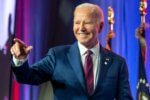While the secular media pushes America further into immorality, Christians sit
and watch. It is time to draw the line and change the channel.
A guest speaker for a youth group at a local church was driving home his point about how powerfully media has shaped our understanding of the world today: “Who’s the character in Seinfeld with the funny hair?”
“Kramer!” came the almost universal reply.
“What time does Friends come on?”
“Eight! Thursday nights. NBC,” offered one young lady, nailing the coordinates in both space and time.
“Complete this line from Spider-Man: ‘With great power comes–‘”
“Great responsibility!” more than 75 voices cried in unison.
“OK,” the speaker said. “Now let’s change gears a bit. Who was the prophet in the Old Testament who had no hair?”
Silence.
“What hour of the day did Jesus die on the cross?” Emboldened by the narrow range of possible answers, a few hands went up and numbers were offered. But it was obvious that nobody really knew.
“Complete this line from Proverbs 3: ‘Trust in the Lord with all your heart and–‘”
“Obey Him?” the NBC girl offered hopefully.
“Sorry, although obeying Him is certainly a good idea. OK, someone explain to me the difference between justification and sanctification.”
The silence among the church’s college group was now deafening.
Sound familiar? It should. In fact, such a scene could probably be repeated in your community, at your church or maybe even in your home. Total media saturation has practically become an American epidemic. It is the cultural air we breathe.
And all it takes is a walk down the aisle of a local video store or a quick Google search on the Internet or a few minutes channel-surfing on cable TV to see that we are in serious trouble. Our culture seems to be obsessed and possessed with crass barbarism–with the most blasphemous, relativistic, humanistic, sexually perverse, violent, occultic and profane forms of entertainment imaginable.
Remember last year’s Super Bowl debacle? Practically a national holiday, pro football’s championship has been called our greatest game, pastime and ritual. The halftime show, unfortunately, is always pretty wretched–bad music, bad dancing, very carefully choreographed, colossally expensive immaturity for the lowest common denominator of our Cretan culture.
But the disgusting display in Super Bowl XXXVIII was little more than razzle-dazzle pornography. It was viciously defiling. It was brazen, vile, lascivious, craven, offensive and repugnant–and it completely ruined the rest of the game.
CBS offered a rather meek corporate apology for the “unintentional” nudity in the show. So did the NFL. But that was only the half of it.
How about the lyrics? How about the bumping, the grinding and the risqué outfits? How about the whole disreputable mess? Did they not expect such lowbrow high jinks when they booked the likes of P. Diddy, Nelly, Kid Rock, Janet Jackson and Justin Timberlake to do the show in the first place?
Even before Jackson’s infamous “wardrobe malfunction,” almost a billion people were assaulted with her singing about a man’s “package” (street slang for “sex organ”) and how she was “gonna have to ride it tonight.” A self-described “bad boy” rapper (with illegitimate children from several different women and a penchant for carrying guns and throwing parties where nude women cavort in the pool) bragged that he was “the definition of half man, half drugs / Ask the clubs, Bad Boy–that’s whassup.”
Another rapper grabbed his crotch while asking his dance partner to “take off all [her] clothes.” A self-avowed “pimp” and “trailer-trash” porn connoisseur performed a medley extolling the virtues of “crack heads,” “crooked cops,” “hookers” and pornography. We certainly have “evolved” from a time when Rhett Butler’s use of the word “damn” in Gone With the Wind was met with a collective gasp–to a “dumb-and-dumber, numb-and-number” culture.
Consider these startling figures: American households with teenage children watch an average of 59 hours of cable and network programming a week. Teens see an average of 67 full-length feature films per year–either in theaters or on video–more than one per week. They own an average of 42 musical compact discs, 16 game cartridges and 7 computer games.
More than 35 percent of all teens have their own TV sets; more than 80 percent own radios; almost 76 percent possess cassette or compact disc players; and although only 39 percent own personal computers, more than 68 percent have access to the Internet. And the numbers are rising rapidly.
This is very serious business. Electronic mass media have become the dominating means of conveying and purveying modern culture among young people.
Is that a good thing? Should we be satisfied with the way this revolution in culture has transpired in our lifetimes?
No way. I believe it’s time to draw the line on media corruption. And according to a recent poll published by Media Analysis, most of you agree with me. More than 81 percent of all Americans polled admitted that they were “seriously concerned” or “uncomfortable” with the direction that modern entertainment has taken of late. Only 2 percent believe that media “should have the greatest influence on children’s values.” But 67 percent believe that it does–wielding even “greater influence than parents, teachers, coaches, or religious leaders.”
TV, Movies and Music
Television has become America’s drug of choice–a kind of “electronic Valium,” as David Chagall claims in Surviving the Media Jungle. And virtually everyone across this vast land is using it. Again, the sheer numbers are worth examining.
More than 98 percent of all households have at least one TV set. In fact, more American households have televisions than have indoor plumbing.
Not surprisingly, American children watch an inordinate amount of programming. Preschoolers watch an average of more than 27 hours each week–more than four hours per day. On school nights, American teens limit their TV consumption to only about three hours per night. In contrast, though, they spend about 54 minutes on homework, fewer than 16 minutes reading, about 14 minutes alone with their mothers and fewer than five minutes with their fathers.
And what is it that we all are watching so obsessively? Sex, dysfunction, perversity, cynicism, skepticism, and anything and everything but moral clarity. And then there is the violence: The average American child watches 8,000 made-for-TV murders and 100,000 acts of violence by the end of grade school. By the time the child has graduated from high school, that number will have doubled.
The casual carnage is woven into supposedly real-life situations with amazing alacrity. One survey found that situation comedies, cartoons and family dramas were just as likely to feature violence as police procedurals, medical dramas and period masques. As telejournalist David Frost has said, “Television enables you to be entertained in your home by people you wouldn’t have in your home.”
With the proliferation of cable-channel options has come a multiplication of the very worst elements of broadcast entertainment from the past–plus, a vastly enlarged menu of offerings heretofore unimagined and unimaginable.
But whatever is wrong with television is doubly wrong with Hollywood films. Television’s flimsy restraints on profane language, gratuitous gore and graphic sexuality are altogether absent in the movies.
Again, the numbers indicate just how profound the problem really is.
According to a recent nationwide poll, 80 percent of Americans believe that there is too much profanity in Hollywood productions. More than 60 percent believe there is too much gratuitous violence. About 55 percent believe that graphic sexuality and scatological subjects detract from the value of a film. And 40 percent believe that they have been “desensitized” to issues of moral concern by their viewing habits.
In his Index of Leading Cultural Indicators, William J. Bennett points out that during the early days of Hollywood, the film industry actually regulated itself according to a self-imposed standard of moral restraint called the Hays Code that was designed to uphold social virtue and cultural cohesion.
An industry committee, the Hays Association checked every single film for content expressing “blasphemy, filthy language, explicit eroticism or perversion, superfluous violence or brutality, ethnic slurs, or anti-American sentiment.” It made certain that any offensive material was edited out–otherwise, the film was not released to the general public.
It is hard for us to imagine today, but this cooperative association for self-censorship sought to uphold community values in virtually every arena that the art of film might touch upon. Hollywood once actually took a voluntary stand for moral clarity!
Critics might try to argue that under such stringent guidelines, no great films could ever be made. The fact is, though, all of Hollywood’s greatest classics were made according to the standards of the Hays Code, including All Quiet on the Western Front, It’s a Wonderful Life, Mutiny on the Bounty, Moby Dick, Gone With the Wind, Casablanca, Miracle on 34th Street and many more. During the entire span of Hollywood’s “Golden Age” the Hays Code was honored.
But no more. It seems that Hollywood filmmakers go out of their way to see how far they can stretch the viewing public’s tolerance for taboo. No wonder the Hollywood establishment worked double overtime to try to trash Mel Gibson’s The Passion of the Christ.
But if there is anything that may actually have more influence over our culture than television and movies, it is music. Music captures the heart. It is a powerful, spiritual force. It can be a tool of great good or a weapon of great destruction.
Too much of our popular music is not even singable. Not only is it often without recognizable tune, pitch, cadence or tenor–and even without melody, harmony or regular rhythm–but it is also so profane that it is unrepeatable. Many rap and rock songs have gone far beyond the mere bounds of pornography to vile brutality, scatological filth, sadistic nihilism, blasphemous irreverence and provocative decadence.
Previously, pop music was almost always sentimental, sappy and insubstantial. Now, it is nightmarishly barbaric. With the advent of grunge rock, hip-hop, goth rock, gangsta rap, death metal and speed metal, a new wave of wildly angry music–with minimal melody lines or hooks, harsh and distorted electronics, incessant syncopations, and vile lyrics–has swept onto center stage.
Steeped in a hopeless worldview of suicide, occultism, sexual abuse, self-mutilation, brutal sadism and random revenge, the music is depressing, dark and deleterious. High-volume, deliberately disgusting and offensive “shock jocks” profile the music and its irreverent lifestyle, its devil-may-care worldview, and its slovenly fashion sense in music videos and over FM radio stations.
This is what our nation’s kids are listening to; this is what they are downloading from iTunes; this is what they are swapping on the Internet; and this is what they have on their iPods. No wonder the song of the soul of America is so dissonant.
A steady diet of that kind of music is likely to have a terrible effect on anyone–but it especially influences impressionable adolescents. And teens have more than a steady diet of it: Between the seventh and 12th grades, the average American teen listens to 10,500 hours of rock music, just slightly less than the total number of hours spent in the classroom from kindergarten to graduation.
Add to television, movies and music the violent or perverse content in many video games and on Internet sites, and you have a prescription for cultural disaster. At every turn the vision, the standards and the precepts that provoked the great flowering of Western civilization are subverted–and that makes for a terribly unstable society.
Starting a Revolution
In essence what we have done is brainwash our children to hate our culture, to hate our mores, to hate beauty and significance, to hate authority and substance, to hate us and to hate each other.
Perhaps that is why our society has become such an inhospitable place. Once upon a time, American culture was actually recognized far and wide for its genial hospitality, gracious sincerity and friendly warmth. While always gregarious, ardent and demonstrative, that enthusiasm invariably seemed to be tempered with a contagious sociability.
But it appears those days are all but gone. Observers of the contemporary American scene are often struck by the grating incivility of our conduct. More often than not we are rude and crude to one another, mocking and disrespectful to due authority, and irreverent and baleful to time-honored convention. We often appear to be hasty and unconcerned about practically anything and everything but our own agendas.
Though most of us still make every effort to be decent, hardworking and upstanding citizens, the effects of this ever-widening culture of impertinence are felt by us all. There is practically no escaping them. They are all too obvious in our business affairs, our community interactions and our interpersonal relationships.
Ultimately, they contribute to a divisive, dehumanizing and disrespectful social environment–one that may even stoke the flames of disaffection and violence among our children.
It is all too evident that there is a civil war going on for the destiny of our nation, our culture and our civilization–one that this generation will lose if popular perversity continues to flourish in our hearts, our homes and our lives.
The question is, what can we do about it? How do we draw the line? Here are some important steps to take to become informed, to protect yourself and your family from the negative influence of the media, and to help bring about societal change.
It won’t be easy to start a cultural revolution, but we can do it if we’re all willing to draw the line by living according to biblical standards ourselves as well as standing up and speaking out for moral clarity in our nation. There are no other options; for the sake of our children, we must win this war.
Rod Parsley is the senior pastor of World Harvest Church in Columbus, Ohio; founder and president of the Center for Moral Clarity; and host of the daily TV broadcast Breakthrough. He is also the author of numerous books, including No Dry Season (Charisma House) and On the Brink (Nelson Books).
The Preacher Is an Activist
Nobody ever accused Rod Parsley of beating around the bush. In his new book, Silent No More, he’s as bold about Christian values as ever.
There was a time when Ohio pastor Rod Parsley kept his sermons strictly focused on spiritual topics. He was not a particularly political guy, and you wouldn’t have expected him to get involved in mobilizing voters or campaigning for legislation.
That all changed on November 5, 2003, when Parsley and a few dozen Christian and pro-life leaders watched President Bush sign the Partial Birth Abortion Ban Act inside the White House.
“That’s when I recognized that I needed to be doing something,” Parsley told Charisma. “Everyone in that room was 20 years my senior, and I felt the Holy Spirit speak to me … I recognized there was a gap in [terms of a] national voice of my generation speaking out on moral issues.”
Parsley decided to close that gap. He founded an activist organization, the Center for Moral Clarity, in July 2004. He challenged viewers of his Breakthrough television show –which reaches 96 percent of American households–to vote for moral values in the 2004 election. And he called Christians to fight same-sex marriage on the grassroots level.
Without realizing it at that time, Parsley was becoming Democratic presidential candidate John Kerry’s worst nightmare. The Columbus-based preacher, who pastors 12,000-member World Harvest Church, crisscrossed the country to mobilize voters. He convinced many of them to vote for Bush–without mentioning the president’s name.
“I certainly never told anyone who to vote for,” Parsley says, “because unfortunately it is illegal. But people of faith know God’s Word and they want to protect marriage and life and will support amendments and candidates who define those issues.”
On the morning after Election Day 2004, when all eyes were on Ohio’s unexpected Republican victory, operatives from the White House called Parsley to thank him. The voters he recruited in his home state had determined the outcome of the entire election. And Ohio–along with 10 other states–passed amendments banning gay marriage.
Parsley says he is just getting started in his new role as pulpit activist. His new book Silent No More (Charisma House) lays out his detailed game plan–in which he calls Christians to champion not only conservative agenda items like abortion and homosexuality but also poverty and racism.
The pastor also is adamant that Congress must pass legislation that will allow churches to speak freely on political issues without jeopardizing their tax-exempt status. And he’s deeply concerned about a California law that could be used to stop Christians from preaching against homosexuality.
In Parsley’s view, the challenge to change our culture has never been more intense. So he’s stepping into the ring and calling all Bible-believing people to join the fight.
Is his decision to end his political silence a step toward a position in government? Parsley says he’s not changing careers.
“Men and women will spend eternity in hell based on the words of a gospel preacher,” he says. “I don’t believe there’s a higher calling than that. Right now that’s what the Lord has me doing.”
J. Lee Grady






Leave a Comment
You must be logged in to post a comment.